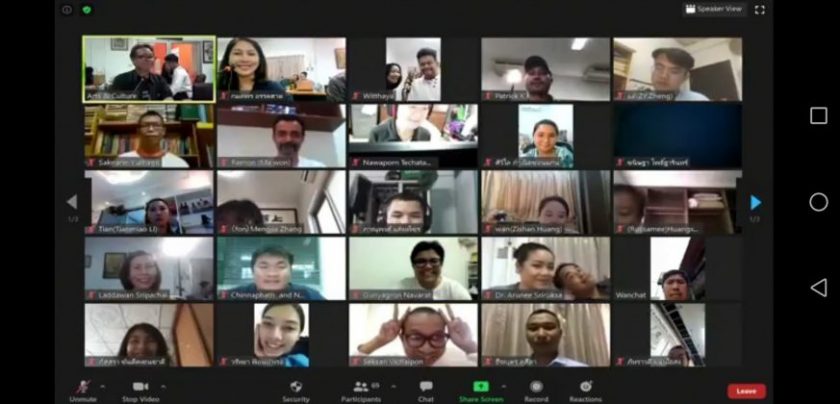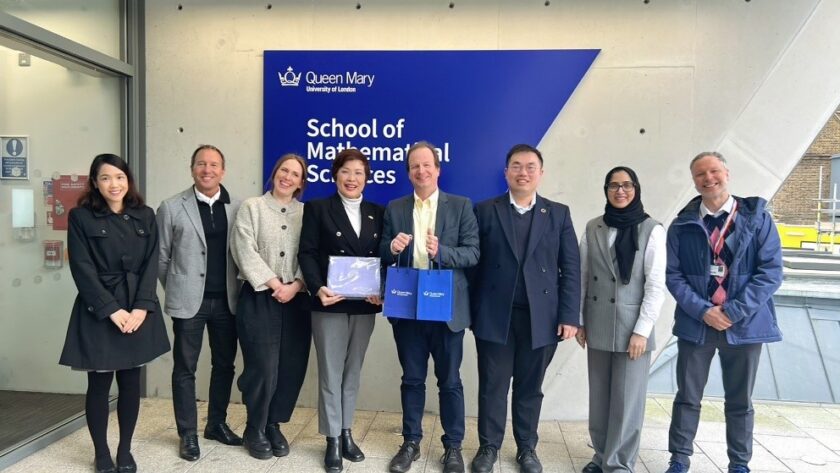August 5, 2020 from 13:00 to 13:30 p.m. – Cultural Center of Khon Kaen University and the Cultural Research, Art and Design Program, Faculty of Fine and Applied Arts held the third online talk on the topic of “Where do we go after death? – principle of after-death belief of the Southeast.” The key target participants were academics and graduate students both inside and outside KKU and abroad. The talk was organized as a VDO conference by Zoom Application. An expert in ancient rituals and beliefs, Dr. Yuthapong Matwiset was invited as the guest speaker and Dr. Laddawan Seepachai acted as the moderator.
The forum began with Assoc. Prof. Dr. Niyom Wongpongkham, Chairperson of the Cultural Research, Art and Design Program introducing and summarizing the second forum on, “True Buddhism, Thai Buddhism, Foreign Buddhism under the New Normal,” which was held on July 25, 2020. Assoc. Prof. Dr. Niyom then introduced the guest speaker who graduated in Engineering but is interested in and has studied on the principles of belief of life after death. Dr. Yuthapong is also a specialist in ancient rituals and beliefs, especially in making the monster bird, Hastilinga.
Dr. Yuthapong Matwiset gave a talk on the principles of belief of life after death, especially of the people in the Southeast many thousands of years back. The belief was that human had the “khwan or spirit”, which was neither the mind, nor the soul. “Khwan” existed everywhere in the body. No word has been formed by any academic to use for “khwan”. The southeastern people’s belief before religions and western influences arrived was that death was not sadness. It was only a trip of the “ghost spirit” from “Muang Lum” or human world to “Muang Fa” or “thaen” or heaven, where everything resembled our world. If, when alive, a person was a farmer, then after death, he would be a farmer, but far away. The “ghost spirit” would live in the land of “thaen”. Whenever there is a “khwan calling” or “su khwan”, that means children in “Muang Lum” call the “ghost spirit” to come to protect them. “Ghost spirits” are thus the “ancestor ghosts”. Funeral or death ritual in the past was a celebration event rather than crying over and missing of the one who passed away. This could be seen in some cultural traces such as the loud drum (Mahorathuk drum), pictures of musical khaen playing or singing and dancing of some ethnic group or sexual intercourses at a funeral in order to balance the population, as can be seen in the “Ngan Huan Dee” rite.
The principle of the world after death is thus an interesting topic. It reflects beliefs of each period. For example, a coffin represents a boat – as in the past the funeral went on using a boat. This was from the belief that the soul will be traveling by water. Sometimes the image of Naga or Great Naga is used based on the belief that Naga is sacred among the southeastern people. Naga possesses power and magic and can take “ghost spirit” to heaven where human is forbidden to enter. We also see the monster bird or Hastilinga used at a funeral rite. The significance in this regard is the local legend and belief. It is also an ancient ritual. The belief in death of people in the Southeast changed after the arrival of Brahman, Buddhism, and western influences. The belief changed from “ghost spirit” to living with God or remaining in the cycle of birth and death based on Karma of each person. The meaning of rites therefore changed with the beliefs and studies on rituals and principles of death. Death may seem to be frightening for some people, but in reality, the inherent meaning and cultural trait can reflect the belief of people from the past that has impact on the present. After removing the inherent culture, we find the long-lasting root of the southeastern people.
At the end of the online forum, participants were invited to ask questions, and many various issues were raised with interest.
Assoc. Prof. Dr. Niyom Wongpongkham publicized at the end the 4th online forum which will be held on Saturday 6, 2020 at 13:30-15:30 on “Whether Isan will be lost”, with Ajarn Charnpichit Phonthongsamran as the guest speaker and Dr. Patara Khotphakdee as the moderator. For more details, visit Facebook Fanpage: KKU Culture Center.
News / Photos: Thidarat Seehakriengkrai, Boonyuen Plengwaja, and Wittaya Wutthithaisong
[ Thai ]







